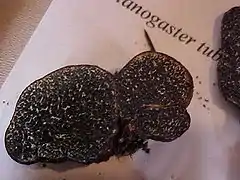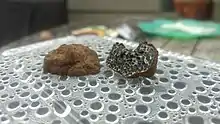| Melanogaster | |
|---|---|
 | |
| Melanogaster tuberiformis | |
| Scientific classification | |
| Kingdom: | |
| Division: | |
| Class: | |
| Order: | |
| Suborder: | Paxillineae |
| Family: | |
| Genus: | Melanogaster |
| Type species | |
| Melanogaster tuberiformis Corda | |

Melanogaster Cross Section
Melanogaster is a genus of fungus that resemble truffles, and are often mistaken for them. However, they do not have the characteristic aroma and value of truffles, although some have been used culinarily. None are known to be poisonous.[1] The genus contains 25 species that collectively have a widespread distribution.[2]
A new polyene pigment, melanocrocin, has been isolated either from fruit bodies or mycelial cultures of the subterranean fungus Melanogaster broomeianus. The structure of the pigment was determined by spectroscopic methods and chemical transformations. Melanocrocin is the N-acyl derivative of L-phenylalanine methyl ester with a polyolefinic carboxylic acid.[3]
Species
- Melanogaster ambiguus
- Melanogaster broomeiani
- Melanogaster variegatus
- Melanogaster tuberiformis
- Melanogaster broomeianus
- Melanogaster wilsonii
References
- ↑ "Frequently Asked Truffle Questions". North American Truffling Society. Retrieved 1 March 2015.
- ↑ Kirk PM, Cannon PF, Minter DW, Stalpers JA (2008). Dictionary of the Fungi (10th ed.). Wallingford: CABI. p. 414. ISBN 978-0-85199-826-8.
- ↑ Aulinger K, Besl H, Spiteller P, Spiteller M, Steglich W (2001). "Melanocrocin, a polyene pigment from Melanogaster broomeianus (Basidiomycetes)". Z. Naturforsch. C. 56 (7–8): 495–98. doi:10.1515/znc-2001-7-803. PMID 11531079. S2CID 41177931.
External links
- "Melanogaster Corda". Atlas of Living Australia.
This article is issued from Wikipedia. The text is licensed under Creative Commons - Attribution - Sharealike. Additional terms may apply for the media files.